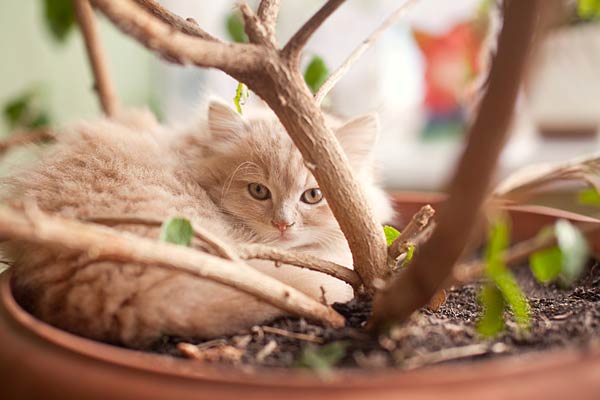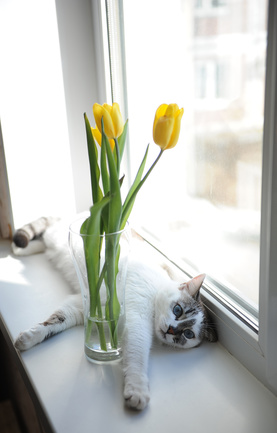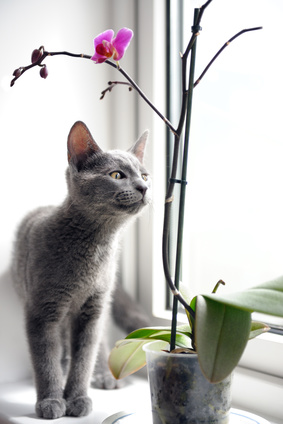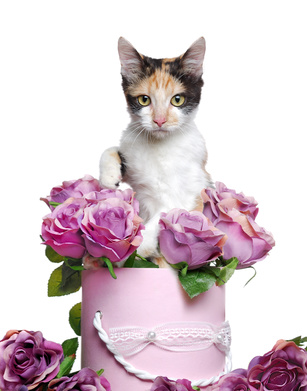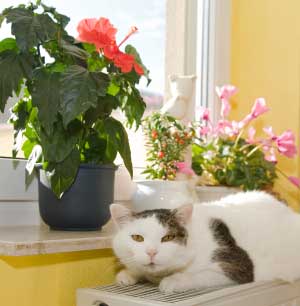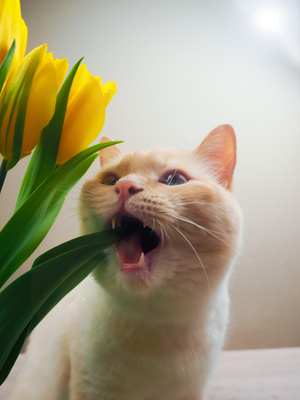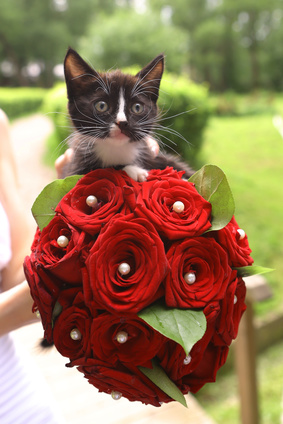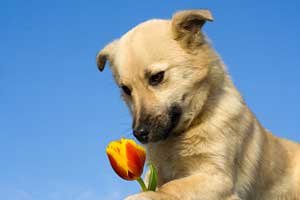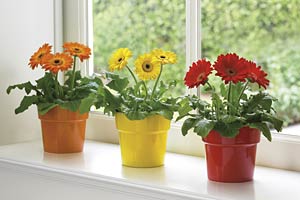Photos of Poisonous Plants and Flowers for Cats
Fluffy Climbed the Palm Tree
Recently, I was amused by a program where a couple was frustrated that their cat was destroying their house plants, especially their palm trees. The cat and plants were saved with the purchase of a climbing tree for cats, however, I wondered if the cat was in more danger than the owners realized. The consumption of some flowers and plants can cause reactions varying from a mild rash to death in cats.
The Answer Is: Lilies
Lilies are extremely toxic to cats. Any part, even just a leaf or pollen, can cause kidney failure and death.
This article is split into 3 sections below:
Flowers Toxic to cats that are commonly used in flower arrangements
Cala Lily
Dangerous Parts:
All Parts
Reaction:
Oral irritation, intense burning, vomiting
Carnation
Dangerous Parts:
All Parts
Reaction:
Vomiting, increased thirst, hemorrhagic gastroenteritis, bruising, liver damage, liver failure.
Chrysanthemums
Dangerous Parts:
All Parts
Reaction:
Diarrhea, vomiting, hypersalivation
Daisies
Dangerous Parts:
All Parts
Reaction:
Diarrhea, vomiting, hypersalivation
Delphinium
Dangerous Parts:
Plants and seeds
Reaction:
Convulsions and death
Gladiolas
Dangerous Parts:
Leaves
Reaction:
Diarrhea, vomiting
Hydrangea
Dangerous Parts:
All Parts
Reaction:
Diarrhea, gas and vomiting
Larkspur
Dangerous Parts:
Plant and Seeds
Reaction:
Convulsions and death
Lily
Dangerous Parts:
All Parts
Reaction:
Vomiting, kidney failure, death
Tulip
Dangerous Parts:
Bulb
Reaction:
Vomiting, depression, diarrhea, hypersalivation
Flowers and plants that cause rashes (Dermatitus)
Agapanthus
Dangerous Parts:
All Parts
Reaction:
Oral irritation, intense burning, vomiting
Cactus
Dangerous Parts:
Leaves and spines
Reaction:
Rash, open sores, and skin infection
Chrysanthemums
Dangerous Parts:
Leaves and Flowers
Reaction:
Rash
Ficus
Dangerous Parts:
Leaves
Reaction:
Rash
Poison Ivy
Dangerous Parts:
All Parts
Reaction:
Rash, blisters
Poison Oak
Dangerous Parts:
All Parts
Reaction:
Rash, blisters
Pothos Ivy (in small amounts)
Dangerous Parts:
All Parts
Reaction:
Rash
Primerose
Dangerous Parts:
Leaves
Reaction:
Rash
Schefflera
Dangerous Parts:
All Parts
Reaction:
Dermatitus
Sumac
Dangerous Parts:
All Parts esp. Berries
Reaction:
Rash, blisters
Flowers that cause upset stomachs (Vomiting, diarrhea, and gas)
Agapanthus
Dangerous Parts:
All Parts
Reaction:
Oral irritation, intense burning, vomiting
Amaryllis
Dangerous Parts:
Bulb
Reaction:
Vomiting, depression, diarrhea, abdominal pain, anorexia, tremors
Baby's Breath (Gypsophila)
Dangerous Parts:
Flowers and Stems
Reaction:
Diarrhea, vomiting
Cala Lily
Dangerous Parts:
All Parts
Reaction:
Oral irritation, intense burning, vomiting
Carnation
Dangerous Parts:
All Parts
Reaction:
Mild gastrointestinal signs
Chrysanthemums
Dangerous Parts:
All Parts
Reaction:
Diarrhea, vomiting, hypersalivation
Clematis
Dangerous Parts:
Roots and leaves
Reaction:
Diarrhea and vomiting
Daffodil (Jonquil)
Dangerous Parts:
Bulb
Reaction:
Diarrhea and vomiting
Daisies
Dangerous Parts:
All Parts
Reaction:
Diarrhea, vomiting, hypersalivation
Freesia
Dangerous Parts:
Bulb
Reaction:
Vomiting
Gladiolas
Dangerous Parts:
Leaves
Reaction:
Diarrhea, vomiting
Hyacinth
Dangerous Parts:
Bulb
Reaction:
Intense diarrhea, vomiting, tremors
Hydrangea
Dangerous Parts:
All Parts
Reaction:
Diarrhea, gas and vomiting
Peony
Dangerous Parts:
Leaves, Stems and Roots
Reaction:
Vomiting, diarrhea, depression
Morning Glory
Dangerous Parts:
Seeds and Leaves
Reaction:
Gastrointestinal upset, agitation, tremors, disorientation, ataxia, anorexia. Seeds may cause hallucination, may cause diarrhea.
Tulip
Dangerous Parts:
Bulb
Reaction:
Vomiting, depression, diarrhea, hypersalivation
Plants that cause upset stomachs (Vomiting, diarrhea, and gas)
Boxwood
Dangerous Parts:
All Parts
Reaction:
Diarrhea and vomiting
Cyclamen
Dangerous Parts:
All Parts
Reaction:
Diarrhea and vomiting
English Ivy
Dangerous Parts:
All Parts
Reaction:
Diarrhea, gas and vomiting
Holly
Dangerous Parts:
Berries
Reaction:
Diarrhea, gas and vomiting
Kalanchoe
Dangerous Parts:
All Parts
Reaction:
Diarrhea and vomiting
Poinsettia
Dangerous Parts:
Leaves and Flowers
Reaction:
Oral irritation, vomiting
Pothos Ivy
Dangerous Parts:
All Parts
Reaction:
Oral irritation, intense burning, vomiting
Schefflera
Dangerous Parts:
All Parts
Reaction:
Oral burning and irritation, vomiting
Flowers and plants that cause organ damage (Kidney, liver, stomach, heart, etc.)
Azalea
Dangerous Parts:
All Parts
Reaction:
Respiratory and Kidney
Cardboard Palm
Dangerous Parts:
All Parts
Reaction:
Vomiting, increased thirst, hemorrhagic gastroenteritis, bruising, liver damage, liver failure.
Crocus
Dangerous Parts:
All Parts
Reaction:
Respiratory, Liver, and Kidney Failure
Foxglove
Dangerous Parts:
Leaves, Stems and Roots
Reaction:
Respiratory and Heart
Juniper
Dangerous Parts:
Berries and Leaves
Reaction:
Kidney Failure
Lily
Dangerous Parts:
All Parts
Reaction:
Kidney Failure
Flowers and plants that cause death
Azalea (in large amounts)
Dangerous Parts:
All Parts
Reaction:
Kidney Failure, convulsions and death
Cyclamen
Dangerous Parts:
After large ingestions of tubers
Reaction:
Heart rhythm abnormalities, seizures, death
Delphinium
Dangerous Parts:
Plants and seeds
Reaction:
Convulsions and death
Dumb Cane (Dieffenbachia)
Dangerous Parts:
All Parts
Reaction:
Convulsions and death
Foxglove
Dangerous Parts:
Leaves, Stems and Roots
Reaction:
Heart Failure and Death
Lantana
Dangerous Parts:
Leaves, Flowers and berries
Reaction:
Multi Organ Failure, convulsions and death
Larkspur
Dangerous Parts:
Plant and Seeds
Reaction:
Convulsions and death
Mistletoe
Dangerous Parts:
Berries
Reaction:
Convulsions and death
Oleander
Dangerous Parts:
All Parts
Reaction:
Liver Failure, convulsions and death
Rhododendron
Dangerous Parts:
All Parts
Reaction:
Kidney Failure, convulsions and death
Sago Palm
Dangerous Parts:
All Parts
Reaction:
Convulsions and death
Flowers that are not toxic to cats and are commonly used in flower arrangements.
Below are some of the flowers that are commonly used in floral arrangements which are listed as Non Toxic to cats by the ASPCA.
Gerber Daisies
not to be confused with common daisies which are on the toxic list above
Keep in mind that most arrangements come with a mixture of flowers, some of which are safe and some of which do pose some level of harm to cats even if it's just an upset stomach. While we wish we could claim certain arrangements are completely cat safe, florists often use greenery and smaller filler flowers interchangeably based on what they have fresh in stock. Even an arrangement of only roses (which are safe) can pose a danger depending on what greenery or filler flowers are used.
Because contact with some flowers and plants can cause reactions varying from an itch to death, it is best to teach your cat not to eat plants and flowers. Just as we baby proof our home for a new child, we must also make our home safe for our four legged children. **Note this is a partial list of the most common plants and flowers. Should your cat eat a plant or flower, call your local poison control office or veterinarian. They can answer any questions and advise of actions needed to counteract poisons.
Emergency Contact Information.
The ASPCA also provides a poison emergency phone line and they maintain one of the most comprehensive databases of flowers and plants toxic to pets. This database was used to identify many of the flowers and plants in this article. If you are looking for a plant or flower that isn't covered here, you should try the
ASPCA website.
Please feel free to download the PDF versions of this page, a
single page printer friendly list or a
multi page list with pictures. While these documents are intended for personal use, veterinarians, animal shelters and other such caregivers are invited to make copies for distribution to concerned pet owners.

